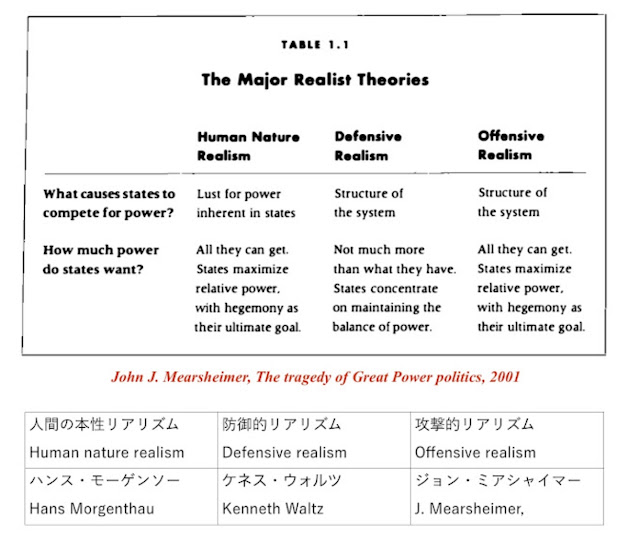次のモーゲンソーの文が、国際政治におけるリアリストの定義の原点のひとつらしいよ、
|
単なる利己主義は譲歩によって鎮められるが、ある要求の満足は、力への意志を刺激し、その要求はますます拡大する。 力への渇き[lust for power]の無制限な性質は、人間の心の一般的な性質を明らかにしている。ウィリアム・ブレイクはこのことを次のように書いている、《「もっと!もっと!」それは誤った魂の叫びである、人間を満足させることはできない》。この無限の、常に満たされることのない欲望は、可能な対象が尽きたときに初めて安らぎを得るものであり、アニムス・ドミナンディ[animus dominandi](支配リビドー)は、宇宙との一体化を求める神秘的な欲望、ドン・ファンの愛、ファウストの知識欲と同じ種類のものである。これらの試みは、超越的な目標に向かって個人の自然的限界を押し広げようとするものであるが、この超越的な目標、休息地点に到達するのは想像の中だけで、現実には決して到達しないという点でも共通している。アレクサンダーからヒトラーに至るすべての世界征服者の運命が証明しているように、またイカロス、ドン・ファン、ファウストの伝説が象徴的に示しているように、実際の経験においてそれを実現しようとする試みは、常にそれを試みる個人の破滅によって終わる。 |
|
…mere selfishness can be appeased by concessions while satisfaction of one demand will stimulate the will to power to ever expanding claims. This limitless character of the lust for power reveals a general quality of the human mind. William Blake refers to it when he writes: '" More! More!' is the cry of a mistaken soul: less than all cannot satisfy man." In this limitless and ever unstilled desire which comes to rest only with the exhaution of its possible objects, the animus dominandi is of the same kind as the mystical desire for union with the universe, the love of Don Juan, Faust's thirst for knowledge. These four attempts at pushing the individual beyond his natural limits towards a transcendent goal have also in common that this transcendent goal, this resting-point, is reached only in the imagination but never in reality. The attempt at realizing it in actual experience ends always with the destruction of the individual attempting it, as tIle fate of all world-conquerors from Alexander to Hitler proves and as the legends of Icarus, Don Juan, and Faust symbolically illustrate. |
|
(ハンス・モーゲンソー『科学的人間対権力政治』Hans Morgenthau, Scientific Man versus Power Politics, 1946年) |
いやあ、実に過激だねえ、このモーゲンソーに準拠するなら、世界戦争は決して終わらないよ、核で人類を破滅させない限り。
用語遣いの基本は実にニーチェ的でーー《この世界は、力への意志であり、それ以外の何ものでもない![- Diese Welt ist der Wille zur Macht - und nichts außerdem! ]》(ニーチェ「力への意志」草稿1886- 1887)、《欲動は…力への渇きだ[die Triebe …der Durst nach Macht]》(ニーチェ「力への意志」草稿1882 - 1887)等々、モーゲンソーはもともとドイツ人でニーチェに馴染んでいたのだろう。彼はカール・シュミットとも付き合いがありシュミットはモーゲンソーを剽窃したなどという話もあるが、1937年にナチを恐れてアメリカ亡命しているーー、フロイトラカン的にはいくらか修正が必要なのだが(欲望は欲動に対する防衛)、でもモーゲンソーの「欲望」を「欲動」に置き直して読めば、精神分析的にもピッタンコだね、例えばフロイトは、力への意志 [Wille zur Macht]=破壊欲動 [Destruktionstrieb] =支配欲動[Bemächtigungstrieb] としているが(参照:力への意志文献)、これこそまさにアニムス・ドミナンディ[animus dominandi](支配リビドー)にほかならない。
いや、ニーチェやら精神分析やらとケチなことを言わず、もっと遡ってソクラテス的と言ったほうがいいかも、ーー《どんな高徳な人と言われているものも、恐ろしい、無法の欲望を内に隠し持っている、という事をくれぐれも忘れるな、それは君が、君の理性の眠る夜、見る夢を観察してみればすぐわかる事だ、ソクラテスは、そういう話をくり返すだけだ。》(小林秀雄「プラトンの「国家」」)
ここで少し前掲げたミアシャイマーのリアリズムの定義を再掲しておこう。
以下、機械翻訳。
人間本性リアリズムは、ときに「古典的リアリズム」と呼ばれることもあるが、モーゲンソーの著作が多くの読者を魅了し始めた1940年代後半から1970年代初頭まで、国際関係研究を支配した。 国家は、生まれながらにして「力への意志」を組み込まれた人間によって率いられるという単純な前提に基づいている。つまり、国家は権力に対する飽くなき欲求、モーゲンソーの言うところの「無限の力への渇き」を持っており、常に攻勢に出て他の国家を支配する機会をうかがっているということである。 人間本性リアリストは、国際的な無政府状態ーー大国を支配する権威の不在ーーが、国家にパワーバランスを懸念させる原因となっていることを認識している。しかし、この構造的な制約は、国家行動の二次的な原因として扱われる。国際政治における主要な原動力は、体制内のすべての国家に内在する力への意志であり、それがそれぞれの国家を覇権獲得に邁進させるのである。 |
Human nature realism, which is sometimes called "classical realism," dominated the study of international relations from the late 1940s, when Morgenthau's writings began attracting a large audience, until the early 1970s. 32 It is based on the simple assumption that states are led by human beings who have a "will to power" hardwired into them at birth. That is, states have an insatiable appetite for power, or what Morgenthau calls "a limitless lust for power," which means that they constantly look for opportunities to take the offensive and dominate other states. All states come with an "animus dominandi, " so there is no basis for discriminating among more aggressive and less aggressive states, and there certainly should be no room in the theory for status quo states. Human nature realists recognize that international anarchy-the absence of a governing authority over the great powers---causes states to worry about the balance of power. But that structural constraint is treated as a second-order cause of state behavior. The principal driving force in international politics is the will to power inherent in every state in the system, and it pushes each of them to strive for supremacy. |
防衛的リアリズムは、しばしば「構造的リアリズム」とも呼ばれ、1970年代後半にウォルツの『国際政治理論』が登場したときに登場した。何よりも安全保障を求めるのである。とはいえ、国際システムの構造上、大国はパワーバランスに注意を払わざるを得ないと彼は主張する。特に、無政府状態では、安全保障を求める国家が互いに力を競い合うことになる。モーゲンソーの理論では人間の本性が安全保障競争の深い原因であるのに対し、ウォルツの理論では無政府状態がその役割を担っている。 |
Defensive realism, which is frequently referred to as "structural realism." came on the scene in the late 1970s with the appearence of Waltz's Theory of International Politics. i6 Unlike Morgenthau, Waltz does not assume that great powers are inherently aggressive because they are infused with a will to power; instead he stans by assuming that states merely aim to survive. Above all else. they seek security. Nevertheless, he maintains that the structure of the international system forces great powers to pay careful attention to the balance of power. In particular, anarchy forces securityseeking states to compete with each other for power, because power is the best means to survival. Whereas human nature is the deep cause of security competition in Morgenthau's theory, anarchy plays that role in Waltz's theory." 〔・・・〕 |
攻撃的リアリズムも人間本性リアリズムも、大国が執拗に権力を求めるものとして描かれていることは明らかであろう。この2つの観点の重要な違いは、攻撃的リアリストは、国家が生まれながらにしてA型の人格を備えているというモーゲンソーの主張を否定することである。反対に、国際システムは大国に相対的なパワーの最大化を強いるが、それはそれが自国の安全保障を最大化する最適な方法だからだと考える。言い換えれば、生き残るためには攻撃的な行動を取らざるを得ないということである。大国が攻撃的な行動をとるのは、自分たちがそうしたいからでもなく、支配したいという内なる欲動があるからでもない。 |
It should be apparent that both offensive realism and human nature realism portray great powers as relentlessly seeking power. The key difference between the two perspectives is that offensive realists reject Morgenthau's claim that states are naturally endowed with Type A personalities. On the contrary, they believe that the international system forces great powers to maximize their relative power because that is the optimal way to maximize their security. In other words, survival mandates aggressive behavior. Great powers behave aggressively not because they want to or because they possess some inner drive to dominate, but because they have to seek more power if they want to maximize their odds of survival. |
(John J. Mearsheimer, The tragedy of Great Power politics, 2001) |
以前はミアシャイマーはモーゲンソーに比べてチョロい(ウォルツほどではないが)と思ったが、冒頭のモーゲンソーの文を読むと、救いようのない人間本性リアリズムじゃなくて、攻撃的リアリズムに微調整したくなる気持ちがよくわかったよ。
